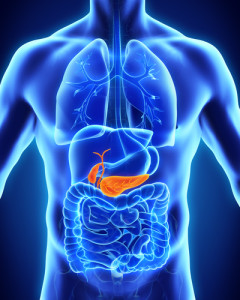By definition, type 1 diabetes is when the body does not break down sugar properly, and when sugar does not break down properly the body does not produce enough energy.
A type 1 diabetic does not produce enough insulin, which is a hormone in the body that allows sugar (glucose) in the bloodstream to enter blood cells and produce energy.
Note: Insulin is produced by the pancreas (see image).

Type 1 diabetes was once called juvenile diabetes because it was most frequently found in children and young adults.
Detecting diabetes early on can help decrease the risk of developing many serious health problems.
In the next section of this page we listed common type 1 diabetic symptoms, if any of them arise contact your doctor immediately and let them know.
Type 1 Diabetes Symptoms:
- Fatigue and weakness – when the body lacks energy and feels restless, a lack of strength.
- Extreme hunger – a desire to eat more food per sitting.
- Increased thirst – dehydrating easily, a desire to drink more often than usual.
- Frequent urination – having to pee more often than usual and in some cases wetting the bed at night.
- Unintended weight loss – losing weight without knowing the cause, without having an explanation.
- Irritability and other mood changes – to be easily annoyed, impatient, or angry.
- Blurred vision – loosing sharpness of vision, not being able to see clearly.
- Vaginal yeast infection – a female condition that is caused by the fungus candida and is sometimes connected to uncontrolled diabetes.
- Abdominal pain – pain that is felt below the ribs and above the pelvis.
- Nausea and/or vomiting – not being able to hold food in your stomach, or have the feeling of food coming up.
Type 1 Diabetes Treatment:
- Insulin – Taking a proper amount of insulin when needed or prescribed by your doctor.
- Testing blood sugar – By testing your blood sugar you will know what your body needs to eat and how much medication to take (per doctor recommendation).
- Eating a healthy diet – eating appropriate foods is known to help reduce symptoms in people with diabetes.
- Carbohydrate counting – eating the correct amount is important for managing diabetes and the body’s energy.
- Exercising regularly – daily exercise helps the body break down sugar by using insulin more efficiently.
- Regular medical checkups – visiting your doctor regularly can help you prevent symptoms from occurring or worsening.
- Not smoking – smoking is bad for your health and is known to amplify diabetic symptoms.
- Not drinking alcohol – alcohol negatively affects the immune system, the immune system helps prevent diabetic symptoms from getting worse.
